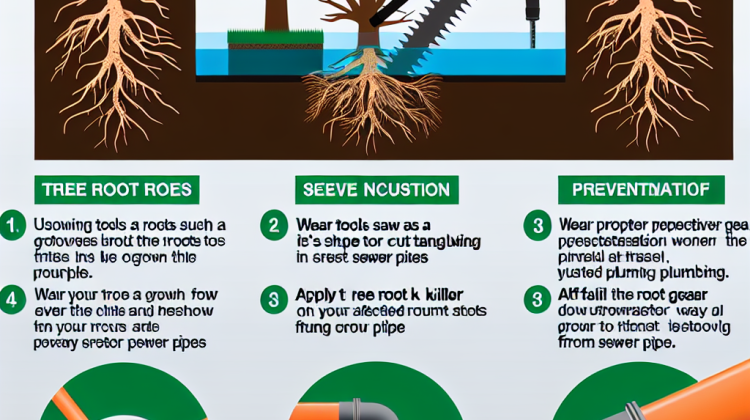
Did you know that tree roots can reach up to 20 feet underground? That’s right! While trees are great for the environment and provide us with shade, their roots can be a real pain when they venture into plumbing systems. Over time, they can crack pipes, create blockages, and cause water to back up in your home. What starts as a little inconvenience can turn into a big mess, which is why knowing how to deal with tree roots in plumbing is so important.
Many folks have battled tree roots invading their plumbing for years. Back in the day, people would just hope for the best and wait for the problem to go away. But, as houses got older and plumbing systems changed, it became clear that ignoring the issue wasn’t an option. Nowadays, homeowners are more aware of how roots can get into pipes, especially during the rainy season when the ground is softer. It’s no wonder this issue is a hot topic in home maintenance.
Imagine you’re enjoying a nice day at home, then suddenly, the sink refuses to drain. Frustrating, right? A study found that about 20% of plumbing issues are linked to pesky tree roots! If you’ve got trees nearby, you might want to take some action before it becomes a big problem. One common solution many people try is using chemical root killers. These products are designed to break down the roots without harming your trees. Kind of neat, huh? But be careful—using too much can damage everything around the pipes as well.
Another trick is to use a plumbing snake to physically break up the roots. It’s an effective way to clear out a clogged pipe, but it requires a bit of elbow grease. You might need to get your hands dirty, but if it means keeping water flowing smoothly, it could be worth it! A lot of people say that a little preventative maintenance goes a long way, like trimming trees regularly to keep roots from getting too close to your plumbing.
Then there’s the option of hiring professionals who specialize in this sort of thing. They can use advanced tools like hydro jetting to clean those pipes effectively. Sure, it might cost a bit more than a DIY fix, but it could save you a ton of cash in the long run by avoiding major plumbing issues. Plus, you won’t have to stress about what’s going on under your yard while you’re focused on your daily life.
It’s also smart to plant trees far away from pipes in the first place. Some folks even recommend using plants that have less aggressive root systems, such as shrubs or smaller trees. That way, you can enjoy your greenery without worrying about your plumbing being at risk. It all comes down to being smart about what you plant and where. Keeping those trees away from underground pipes can save a lot of headaches down the road!
How to Kill Tree Roots in Plumbing
Tree roots can really cause a mess when they invade plumbing. They can sneak into pipes looking for water and nutrients. So, if you’ve got plumbing troubles because of tree roots, you’re not alone! Let’s explore how to tackle this issue.
Use Chemicals Carefully
Chemicals can be effective if used correctly. There are products out there designed to kill tree roots. These chemicals can break down roots and stop them from growing back. But watch out! You don’t want to harm your tree or nearby plants. Always read the instructions carefully. Keep pets and kids away during and after application to stay safe.
Try Copper Sulfate
One popular method is using copper sulfate. This blue powder can be poured down the toilet or drains. It works by slowly poisoning the roots that are in the pipes. Just remember, it’s a slow process, so don’t expect instant results. You might need to repeat it a few times a year.
Use a Root Destroyer
If you want a more natural approach, you can use a root destroyer. Products with nematodes are great for this! They’re tiny worms that eat up the roots. They’re safe for the environment and don’t hurt your trees. But give them a little time; they don’t work overnight!
Drain Cleaners
Sometimes, a good drain cleaner can do the trick too. Did you know that there are drain cleaners specifically for tree roots? These products can help clear away roots blocking your pipes. However, don’t use them too often, or they might damage your pipes.
Mechanical Methods
If you’re up for some hard work, you can get physical! A plumber can use a tool called a rooter to cut away roots blocking the pipes. This machine has a sharp blade that slices through roots. It’s quick and effective, but be careful—you may need a professional to do this job right.
Maintain Your Trees
Taking care of your trees might help prevent future problems. Make sure to keep roots healthy and pruned. Trimming back any roots that threaten your plumbing can save you a whole lot of trouble. Plus, healthy trees are less likely to invade pipes in the first place!
Statistics to Consider
Believe it or not, tree roots are to blame for about 80% of all sewer line blockages! That’s a pretty big number, isn’t it? So, tackling this issue early can save you from a messy situation!
“`html
How to Kill Tree Roots in Plumbing FAQ
What are tree roots doing in my plumbing?
Tree roots are like sneaky little ninjas! They’re always on the lookout for water. If there’s a crack or leak in your pipes, roots can sneak in and cause jams. They love the moisture and nutrients in the pipes!
How can I tell if tree roots are blocking my pipes?
If your drains are slow, gurgling, or you see water backing up, roots might be the culprit. You may also smell weird things or see puddles in your yard. Yikes!
What can I do to kill the roots without harming the tree?
Try using special root-killing chemicals that won’t harm the tree. They’re like a magic potion for your pipes! Another option is to cut the roots back if it’s safe to do so.
Can I use vinegar and salt to kill the roots?
Yes, sir! Mixing vinegar and salt can help. Just pour it down the drain. This combo is like a superhero for your pipes, but don’t use too much, or it might hurt the tree.
Is it safe to use chemicals for killing tree roots?
Some chemicals can be safe if used correctly. Always follow the instructions on the label. If you’re unsure, ask for help from a plumber. Better safe than sorry!
How often should I treat tree roots in my plumbing?
It’s a good idea to check and treat your pipes once a year. Like a regular doctor visit for your plumbing! This can help catch those naughty roots before they cause big problems.
Will cutting the roots kill the tree?
Not usually, but it could hurt it a bit! If you cut too many roots, the tree might get sick. It’s best to trim only what’s needed and maybe call a pro for advice.
Can I prevent tree roots from invading my pipes?
You bet! Keep your pipes in good shape, fix any leaks, and plant trees far away from your plumbing. It’s like giving your pipes a shield against those sneaky roots!
What should I do if the roots are too deep to reach?
If the roots are deep and causing real trouble, it’s time to call in the experts. A plumber can use special tools to help remove them safely. No need to stress!
Are there natural ways to deal with tree roots?
Absolutely! You can try things like using boiling water or even coffee grounds. They might help repel those pesky roots. Nature has got your back!
“`
Conclusion
Killing tree roots in plumbing can be tricky, but it’s definitely doable! First off, using chemical root killers can really help. These special products break down roots that sneak into your pipes. Just be careful to follow the instructions and keep it safe. Also, keeping an eye on the trees near your pipes is super important. If you notice roots moving toward your plumbing, it’s best to act fast! Removing part of the tree or even using physical tools like a plumber’s snake can make a big difference too.
Lastly, planting trees far away from pipes and using good barriers can help prevent future root problems. Regular pipe inspections can also catch any issues before they get too big. In short, tackling tree roots in plumbing needs a mix of smart techniques and a little bit of elbow grease. Like they say, an ounce of prevention is worth a pound of cure! So, keep those roots in check, and your plumbing will be happy for a long time.
